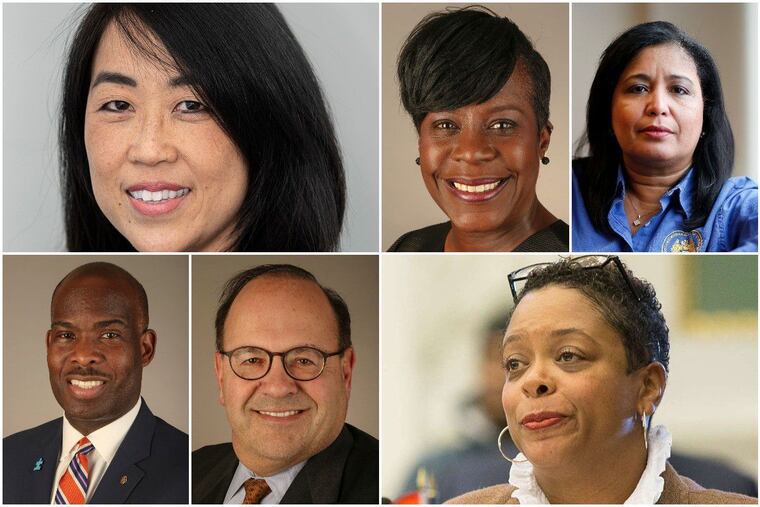The next Philly mayor’s race is in 2023 but the money race has already started
New campaign finance reports are in for several Philadelphia elected officials who are potentially running for mayor in 2023 to succeed Jim Kenney. Here's what they tell us.

New campaign finance reports are (mostly) in for several Philadelphia elected officials who are potential candidates for mayor in 2023 to succeed Jim Kenney.
Let’s take a look at the Democratic field — Philly is, after all, an overwhelmingly Democratic city. And then let’s talk about why the candidates are likely to be overshadowed in the money race, again, by big-spending outside interests.
Here’s how much money the contenders had in their campaign accounts as of Jan. 1, in descending order.
Rebecca Rhynhart. The only person on this list who is not also on City Council is also the most flush with cash, since she didn’t have to run a campaign last year. Rhynhart, who was elected city controller in 2017 and is keeping her options open for 2023, had $353,522 in the bank at the start of the year.
Helen Gym. Stop us if you’ve heard this one before: Gym is in first place in the money race among Council members. The top Council at-large vote-getter from 2019 leads the 2023 Council pack with $51,337 in the bank.
Cherelle L. Parker. The former state representative and newly elevated Council majority leader starts her second term representing Council’s 9th District, which encompasses parts of Northwest and Northeast Philadelphia, with $44,333 in the bank.
María Quiñones-Sánchez. She starts her fourth term in the 7th District, which stretches from North Philadelphia through Kensington and up to Oxford Circle, having once again defied the Democratic establishment, and with $35,003 in the bank.
Derek Green. This at-large member enters his second term with $11,974 in the bank.
Allan Domb. Don’t get tricked by the numbers here. This real-estate investor starts his second term in an at-large seat with just $2,613 in the bank and $198,000 in campaign debt. But all that debt is owed to himself, reflecting the very deep pockets of the wealthiest member of Council. If he runs, he could be a self-funding contender.
Bobby Henon. Hear us out on this third-termer from the river wards of the 6th District, currently under federal indictment with other officials from Local 98 of the International Brotherhood of Electrical Workers. He has $29,481 in the bank and $38,427 in debt, putting him almost $9,000 into the red. But some in City Hall aren’t counting him out for 2023 if he can survive the trial. He and other other union officials have pleaded not guilty.
Cindy Bass. The third-termer from Northwest Philadelphia’s 8th District hasn’t yet filed her annual report, which was due Friday.
Campaign donations can be a key indicator of electoral potential. But we’re also keeping an eye on where political action committees (PACs) are placing their dollars, and in what amounts.
That’s because 2019 saw a repeat of a trend first spotted in 2015, when so-called independent expenditure PACs outspent the candidates for mayor. These PACs can raise and spend money undeterred by the city’s campaign finance limits, as long as they don’t coordinate with a candidate or campaign.
Forward Together Philadelphia raised almost $1.6 million to support Kenney’s bid for reelection, even though he was never in danger of losing the Democratic primary and didn’t even bother to campaign in the general. Former New York Mayor Michael Bloomberg, now a presidential candidate and a fan of Kenney’s soda tax, kicked in $1 million, while teachers’ unions put up $250,000 and trial lawyers contributed $300,000.
Philly 2019, funded by local building trades unions, raised an additional $931,869 to support Kenney in the primary, with $400,000 coming from Local 98 and $200,000 from the Steamfitters Local 420. A similar PAC was critical to Kenney’s first race for mayor in 2015. Local 98′s PAC, funded by many frequent small-dollar donations from the union’s members, remains a powerhouse despite recent legal troubles, ending 2019 with almost $9.4 million in the bank.
The American Beverage Association’s PAC raised $3.5 million, but television commercials the trade group aired in opposition to the soda tax had little impact. The ABA has reported spending just under $19 million in lobbying from 2016 to 2019.